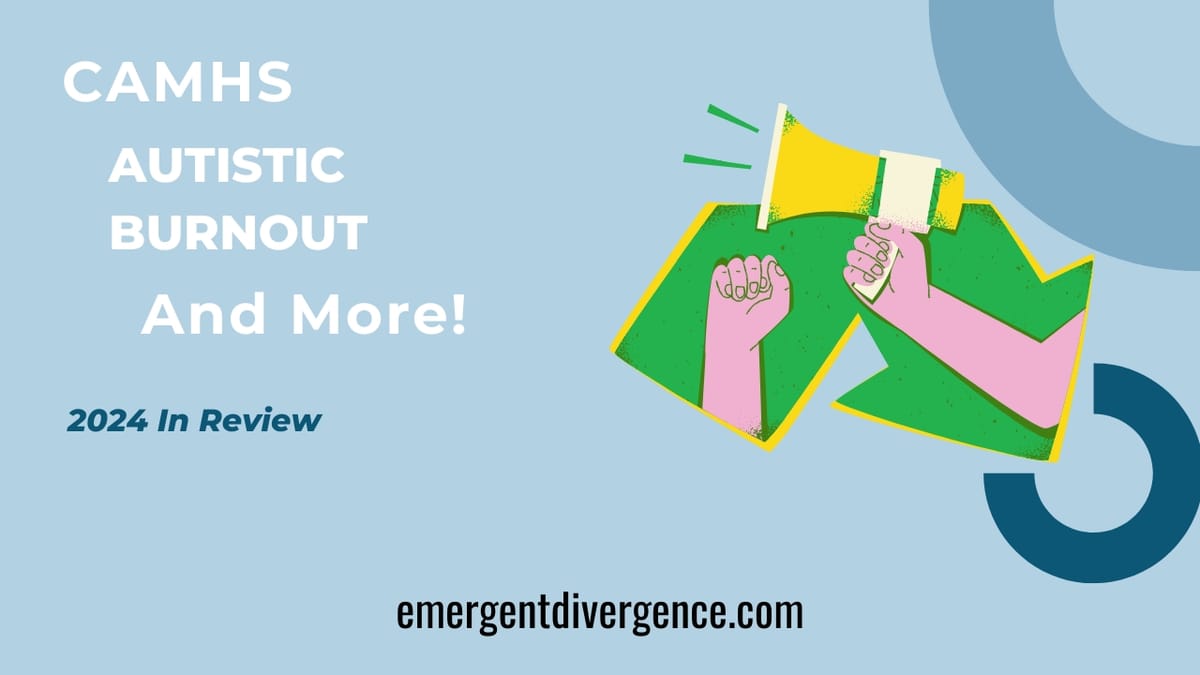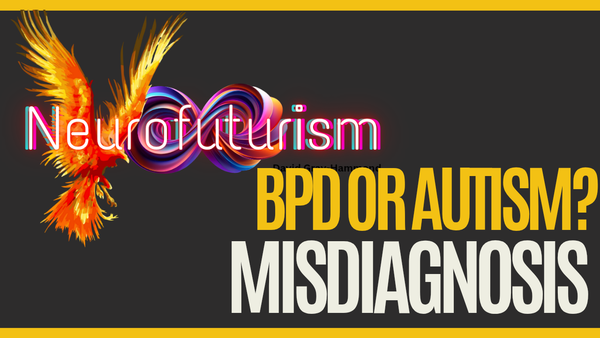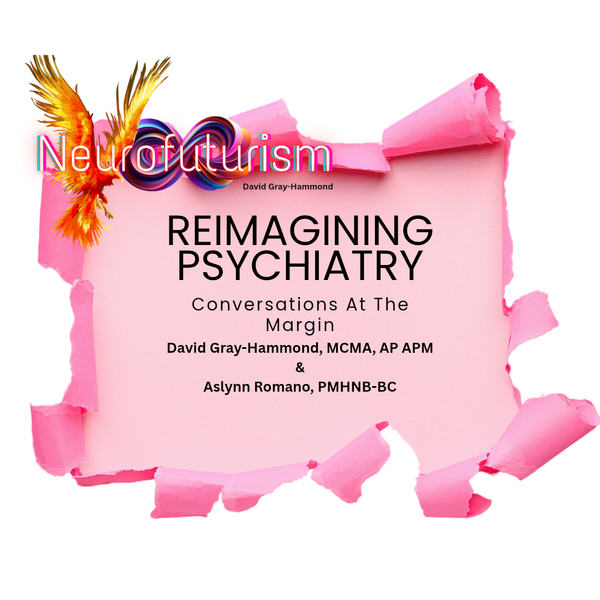2024: A Year of Change for Autistic Activism
In 2024, significant strides were made for Autistic liberation, showcasing both systemic failures and the strength of Autistic activism. This article focuses on the challenges faced in Child and Adolescent Mental Health Services (CAMHS), explores Autistic burnout, and talks about what the work of 20

2024 has been a year of action and striving for change. We have seen some of the worst failures of the system, while at the same time seeing the tremendous power of Autistic online spaces. Whether you've been involved in direct action, or just shared content related to the ongoing struggle for Autistic liberation, each on of us has been instrumental in the ongoing work of the neurodiversity movement.
My personal work has gained a great deal of momentum over the past twelve months; from fighting for systemic change in Child and Adolescent Mental Health Services (CAMHS) to exploring Autistic burnout and how it impacts mental health. 2024 has been a year where a great deal has happened, and I hope that it continues on this trajectory over the coming years.
I felt it would be good to explore some of the significant themes from this year, and consider what the future may hold. Not only have I engaged in a great deal of social action, I have also published a new book, and put in motion the start of regular webinars that people can attend. As my work grows, I hope that it grows in a direction that is valuable and helpful to a community that saved my life.
A Year of Battling CAMHS
When I first saw a petition by the CEO of Autistic Inclusive Meets, Emma Dalmayne, challenging the failure of CAMHS to support Autistic children and young people, I knew we were onto something big. I have known Emma for some years now, and her fierce and determined activism has created a great deal of change for the Autistic community. It saddens me that Autistic activism does not make it into mainstream knowledge, and yet at the same time, the changes it creates have repercussions globally.
Over the past year I have written extensively about CAMHS, attended protests, and met and worked with the Care Quality Commission to try and create change. While change is a slow process, the seeds of a better future for our Autistic children and young people have been planted, and we now have a duty to nurture and take care of them. A big part of my work has been the reports I have produced on experiences of CAMHS, which can be found at the button below:
CAMHS is an important topic to me because I have been through that system myself. I was a teenager facing the spectre of psychological distress, and rather than help me, I was dismissed and condemned to years of addiction and psychosis. I can not allow that to keep happening to Autistic children, whose struggle I know only too well. Alongside my professional advocacy work, this activism, couple with my books and reports, serve as my declaration that I will not tolerate systemic failures any longer.
The Toll of Autistic Burnout
Another significant focus of mine has been the experience of Autistic burnout. Drawing on academic and community knowledge I have explored the nature of Autistic burnout and how it relates to our mental health. One topic in particular that has been incredibly relatable for people has been the burnout to psychosis cycle. This year the article I co-authored with Tanya Adkin has had over 16,000 views, making it the most popular article on this website since I first started writing.
https://emergentdivergence.com/2023/06/05/creating-autistic-suffering-the-audhd-burnout-to-psychosis-cycle-a-deeper-look/
Autistic burnout is both one of the most widely discussed aspects of our experience, while still remaining somewhat enigmatic, largely due to attempts to create a generalised and objective criteria for it's identification. The truth is that burnout is as complicated and varied as the people it impacts, and has significant ramifications for our wellbeing. In my own life, Autistic burnout has been responsible for much of the complications I have experienced. While the changes it created in me were necessary, I do not want to detract from the suffering I went through on that part of my journey.
Upcoming Webinars: January and February
As I mentioned, I have made moves to begin delivering online webinars on various topics related to autism and neurodiversity. While there is a fee for tickets, I have done my best to provide options to make it accessible to anyone who wants to attend them. The first of these webinars will be in January 2025, with a second schedule for February 2025. You can use code AUT15 for 15% off of ticket costs. There is a "Pay What You Can Afford" option to keep it accesible.
- January 2025: Is Autism a Disorder? Insights from the Neurodiversity Movement.
- This webinar will look at the historical context behind the view that autism is a disorder, exploring how neuronormativity and systemic issues have been used to dehumanise Autistic people.
- Using insights from the neurodiversity movement, I will challenge the normative attitudes around autism and disability, and ask the question as to why Autistic people of any support needs are viewed as disordered.
- The ultimate aim is to look towards a world wherein we can accommodate the needs of all Autistic people without medicalising or dehumanising them.
- February 2025: Working With Neurodivergent Co-Workers
- The aim of this webinar is to equip neurodivergent people and their allies to be more inclusive in the workplace.
- It will look at community understanding of Autistic and neurodivergent experience and how that impacts us at work.
- This webinar will be helpful for anyone who wants to better support neurodivergent people in the world of work.
A Guide to Autism and Psychosis
My new book A Guide to Autism and Psychosis released recently and I have been really happy with it's reception. This book combines my personal and professional experience with autism and psychosis while looking at the academic and community knowledge on the topic. It explores the nature of psychosis in Autistic people while also considering ways to support Autistic people through psychosis and how to reframe our understanding of mental health. Below is a review of the book by the wonderful Katie Munday.
https://autisticltd.co.uk/2024/12/19/book-review-a-guide-to-autism-and-psychosis-by-david-gray-hammond/
I will be holding a book launch event in January at Puzzle Bored in Brighton, East Sussex. If you are able to attend, the details can be found by visiting the facebook event listing. Please do RSVP if you are coming, or will try to come as it really helps the visibility of my book and it's launch.
My book is available now on kindle and in paperback format. If you would like to get a copy, you can do so at the link below. The link is for the UK Amazon website, but the book should also be available in your own country as well if you are not in the UK.
Campaigning Into 2025
As we look toward 2025 and the work we will be doing, one thing stands out more than anything else. The UK Government has issued an immediate ban on the use of puberty blockers for Trans and Gender-Diverse children and young people. While they claim this is due to the danger of the medications, that delay the onset of puberty, giving a child time to work out their gender identity, they have not banned them for uses such as prevovious puberty in cis-gender children.
This hypocrisy and overt targeting of an extremely marginalised community can not go unaddressed. That is why we have hand delivered an open statement on this to Wes Streeting, Secretary of State for Health and Social Care. We have video of him promising to read and respond to the statement (see below). You can read and sign our open statement by clicking the button below.
Each year, life seems to become more busy for me, but I can honestly say that I love the work I do and will not stop fighting for the Autistic community any time soon. This day ten years ago it was unclear if I would survive to my 30th birthday. Now I have a life and career that I am so happy with and proud of. Each of you made that possible. You saved my life, and I really want you to realise the profound good you have done for me. I hope that 2025 is a fruitful and happy year for you.


